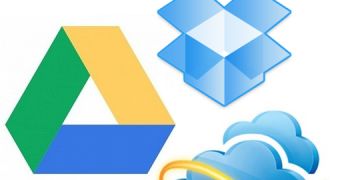With Google Drive out, the cloud sync market is pretty much defined. There are plenty of players, but three stand out and offer the most similar set of features, Google Drive, Dropbox and Microsoft SkyDrive.
Each has its own quirks and unique features, but the core service is exactly the same, as far as the file syncing is concerned.
They do differ in the amount of free storage space they offer. If you're not particularly interested in paying for online storage, and who is, you'll probably want to go with the service that offers the biggest amount for free.
That may seem like a simple enough question to answer and, at a glance, SkyDrive is the clear winner. Microsoft's cloud offers 7 GB from the get go, compared to Drive's 5 GB and Dropbox's paltry 2 GB.
But there are caveats, quite a few of them. With Drive, what you see is what you get, 5 GB up front and that's it.
But, while Dropbox may seem like the poorest option, it's not. You get 500 MB for free if someone referred you. You also get 500 MB for anyone you manage to convince to sign up for Dropbox, up to 16 GB in bonus storage.
But that's not all, if you're willing to use the beta versions of the Dropbox apps, you can earn up to 3 GB more in free storage by syncing photos. Previous beta tests offered up to 5 GB.
You get 250 MB for completing the getting-started checklist and another 640 MB by connecting to Twitter, Facebook and so on. In the end, you can get up to 6 GB relatively easy and all the way up to 22 GB of free storage if you have a lot of friends that haven't heard of Dropbox yet.
Here's a complete guide to maxing out your Dropbox free storage.
SkyDrive doesn't have any referral bonuses; however, if you used the service before the Windows app debuted, April 22nd to be exact, you can upgrade your paltry 7 GB to a full 25 GB, making SkyDrive the most attractive option once again.
Assuming the best conditions, Dropbox comes rather close to SkyDrive, with the added advantage that you get a Linux client and an Android client. SkyDrive has a Windows Phone version though, Dropbox does not.
Of course, there's nothing forcing you to pick, you can install all three side by side and have more than 50 GB of free cloud storage.
Google Drive: 5 GB default | 5 GB maximum SkyDrive: 7 GB default | 25 GB maximum - if you have an older SkyDrive account Dropbox: 2 GB default | ~22 GB - 24 GB maximum - referral bonus, beta testing bonus, etc.

 14 DAY TRIAL //
14 DAY TRIAL //